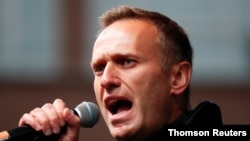It is welcome news that Russian opposition leader Alexei Navalny is out of a medically-induced coma and is responding to verbal stimuli, according to his doctors in Berlin. A statement from Charite hospital warned, however, that it “remains much too early to gauge the potential long-term effects of his severe poisoning.”
Mr. Navalny was flown to Berlin from Russia after he fell ill on a flight from Siberia to Moscow on August 20, and after Russian doctors, at the request of his family, allowed him to be transported to Germany. In Berlin German doctors determined that Mr. Navalny, who is a fierce critic of Russian President Vladimir Putin, had been poisoned by a nerve agent of the Novichok group, a chemical weapon developed by Russia.
After the German medical experts announced their findings, U.S. Ambassador to Russia John Sullivan called for “an immediate, comprehensive, and transparent investigation by the Russian authorities that holds the parties behind this act responsible.”
White House Press Secretary Kayleigh McEnany described Mr. Navalny’s poisoning as “completely reprehensible:”
“Russia has used chemical nerve agents in the past, and we’re working with our allies and the international community to hold those in Russia accountable wherever the evidence leads and restrict funds for their malign activities. The Russian people have a right to express their views peacefully without fear of retribution of any kind, and certainly not with chemical agents.”
Emphasizing the need for a collective response, NATO Secretary General Jens Stoltenberg said NATO Allies “were united in condemning” the “horrific” attack on Mr. Navalny, and urged Russia to participate in an impartial, international investigation into the circumstances of the attempted assassination and find those responsible.
The G7 Foreign Ministers issued a written statement also calling on Russia “to urgently and fully establish transparency on who is responsible for this abhorrent poisoning attack and bearing in mind Russia’s commitments under the Chemical Weapons Convention, to bring the perpetrators to justice.
“This attack against opposition leader Navalny is another grave blow against democracy and political plurality in Russia,” said the G7. “We will continue to monitor closely how Russia responds to international calls for an explanation of the hideous poisoning of Mr. Navalny.”
Secretary of State Michael Pompeo echoed the G7 statement saying, “This attack contravenes the international norms prohibiting the use of such weapons.”






